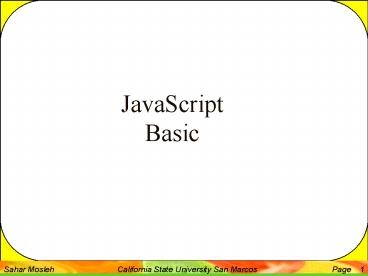JavaScript - PowerPoint PPT Presentation
1 / 19
Title:
JavaScript
Description:
body bgcolor='white' P Paragraph 1 /P SCRIPT LANGUAGE='JavaScript' type ... BODY BGCOLOR='WHITE' is a HTML code to set the background color to white. ... – PowerPoint PPT presentation
Number of Views:52
Avg rating:3.0/5.0
Title: JavaScript
1
JavaScript Basic
2
- What is JavaScript?
- JavaScript was designed to add interactivity to
HTML pages. - A JavaScript consists of lines of executable
computer code - A JavaScript is usually embedded directly into
HTML pages - JavaScript is an interpreted language (means that
scripts execute without preliminary compilation) - Everyone can use JavaScript without other
computer language background.
3
- Are Java and JavaScript the Same?
- NO!
- Java and JavaScript are two completely different
languages in both concept and design! - Java (developed by Sun Microsystems) is a
powerful and much more complex programming
language - in the same category as C and C.
4
- What can a JavaScript Do?
- JavaScript gives HTML designers a programming
tool - HTML authors are normally not programmers,
but JavaScript is a scripting language with a
very simple syntax! Almost anyone can put small
Scripts" of code into their HTML pages. - JavaScript can put dynamic text into an HTML page
for example the drop down menu on a web site
may be old HTML code behind it but to interact
with users input is the job of java script
code. - JavaScript can also used for various tricks- for
example you can switch image in a page for a
different one when the user rolls her mouse over
it.
5
- How to Put a JavaScript Into an HTML Page
- lthtmlgt
- ltbodygt
- ltSCRIPT LANGUAGE"JavaScript
typetext/JavaScriptgt - document.write("Hello World!")
- lt/scriptgt
- lt/bodygt
- lt/htmlgt
- The code above will produce this output on an
HTML page - Hello World!
6
- Example Explained
- To insert a JavaScript into an HTML page, we use
the ltscriptgt tag (also use the type attribute to
define the scripting language). - So, the ltscript type"text/javascript"gt and
lt/scriptgt tells where the JavaScript starts and
ends - lthtmlgt
- ltbodygt
- ltSCRIPT LANGUAGE"JavaScript typetext/JavaScri
ptgt - ...
- ...
- lt/scriptgt
- lt/bodygt
- lt/htmlgt
7
- The word document.write is a standard JavaScript
command for writing output to a page. - By entering the document.write command between
the ltscript type"text/javascript"gt and lt/scriptgt
tags, the browser will recognize it as a
JavaScript command and execute the code line. In
this case the browser will write Hello World! to
the page - lthtmlgt
- ltbodygt
- ltSCRIPT LANGUAGE"JavaScript
typetext/JavaScriptgt - document.write("Hello World!")
- lt/scriptgt
- ltbodygt
- lt/htmlgt
- Note If we had not entered the ltscriptgt tag, the
browser would have treated the document.write("Hel
lo World!") command as pure text, and just write
the entire line on the page.
8
Another example lthtmlgt ltbody bgcolor"white"gt ltP
gtParagraph 1lt/Pgt ltSCRIPT LANGUAGE"JavaScript
typetext/JavaScriptgt document.bgColor
"RED" lt/SCRIPTgt lt/bodygt lt/htmlgt
9
- Example Explained
- ltBODY BGCOLORWHITEgt is a HTML code to set the
background color to white. - To insert a JavaScript into an HTML page, we use
the ltSCRIPT LANGUAGE"JavaScript
typetext/JavaScriptgt to start the JavaScript
code - Document.bgcolor RED set the background to
red. - ltSCRIPTgt to end the JavaScript code
10
(No Transcript)
11
- Ending Statements With a Semicolon?
- With traditional programming languages, like C
and Java, each code statement has to end with a
semicolon. - Many programmers continue this habit when writing
JavaScript, but in general, semicolons are
optional! However, semicolons are required if you
want to put more than one statement on a single
line.
12
Try It Out lthtmlgt ltbody bgcolor"white"gt ltPgtParag
raph 1lt/Pgt ltSCRIPT LANGUAGE"JavaScript"gt //
Script block 1 alert("First Script
Block") lt/SCRIPTgt ltPgtParagraph 2lt/Pgt ltSCRIPT
LANGUAGE"JavaScript"gt // Script block 2
document.bgColor "RED" alert("Second
Script Block") lt/SCRIPTgt ltPgtParagraph
3lt/Pgt lt/bodygt lt/htmlgt
13
- How Does it work?
- The first part of the page is the same as our
earlier example. The background is set to white
and paragraph 1 is written. - lthtmlgt
- ltbody bgcolor"white"gt
- ltPgtParagraph 1lt/Pgt
- The first new section in the first script block
- ltSCRIPT LANGUAGE"JavaScript"gt
- // Script block 1
- alert("First Script Block")
- lt/SCRIPTgt
- // Script block 1 is just a comment, browser
ignores anything after //
14
- alert("First Script Block") The alert function
enable us to alert or inform the user about
something, by displaying a message box. The
message to be given in the message box is
specified inside the parenthesis of the alert()
function and is known as the functions
parameter.
15
- once you click OK, the browser carries on parsing
down the page through the following lines - ltSCRIPT LANGUAGE"JavaScript"gt
- // Script block 2
- document.bgColor "RED"
- alert("Second Script Block")
- lt/SCRIPTgt
16
(No Transcript)
17
- The second paragraph is displayed and the second
block of JavaScript is run. - First line is comment
- Second line is changing the background color.
- The third line is the alert function
- When we close the message box, the browser moves
on to the next lines of the code in the page,
displaying the third paragraph.
18
(No Transcript)
19
- We have seen in the preceding example that by
using JavaScript we can change the background
color of the page by using BGCLOR property of
document. - We are able to use this property with both
internet explorer and Netscape browsers. However
for other property and functions this is not
true. - the material In this course is going to be
compatible with internet explorer and Netscape
browsers version 4 and above. - Over the course we will be developing part of a
web-based application, namely Trivia Quiz that
works with both Netscape and explorer 4.0. - We mainly later on in the course focus on the
property and the functions that works with the
Explorer 6.0 (new internet explorer)

